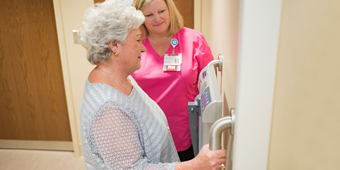Confused? The Culprit May Be a UTI

Answer a few questions and we'll provide you with a list of primary care providers that best fit your needs.
If you feel burning when you urinate, you may quickly recognize the problem as a urinary tract infection, or UTI. But when you’re older, a UTI can be more difficult to diagnose. It may even cause confusion and other symptoms of dementia. At the same time, an older adult with Alzheimer’s disease or dementia may miss the signs of infection, or be unable to tell you about them.
UTIs are a common bladder condition, usually caused by bacteria. They occur more often in women, and become more frequent as we age. Most infections are not serious and can be cured quickly. But some UTIs can lead to severe, even life-threatening, problems, making it critical to catch them early.
If an older adult is disoriented for no clear reason, ask a health care provider to test for a UTI.
UTI Symptoms in Older Adults
Sometimes it’s hard to figure out if an older adult has a UTI, as she may not experience the classic signs. And if her memory is impaired, she may not be able to tell you about them.
Classic UTI symptoms include:
- Pain or burning with urination
- Pelvic pain
- Pain on one side of your back, below your ribs
- Frequent urination
- An urgent need to urinate
- Fever and chills
- Bad-smelling or cloudy urine
Non-classic UTI symptoms can include:
- Agitation
- Lethargy
- Falls
- Urinary retention
- Decreased mobility
- Lack of appetite
If the infection spreads to the kidneys, these severe symptoms may appear:
- Fever
- Flushed skin
- Back pain
- Nausea
- Vomiting
How to Treat

A more severe infection might require a broad-spectrum antibiotic like:
UTIs in older adults are typically treated with antibiotics. Start taking them as soon as possible after diagnosis. Be sure to finish all of them, even if you are feeling better. Stopping early increases the risk of recurrence and antibiotic resistance. Your infection should clear up in a few days. Your doctor may give you:
- Amoxicillin
- Nitrofurantoin
- Ciprofloxacin
- Levofloxacin
Drink plenty of water during your treatment to help flush out any remaining bacteria.
UTI or Dementia?
Dementia causes confusion, and so can a UTI. It can be difficult to tell if an older adult has a UTI, as she may not experience the typical signs but instead appear confused.
If an older adult is disoriented for no clear reason, ask a health care provider to test for a UTI. It’s easy to confirm with a simple urine test.
Other factors connected with aging put older adults at a higher risk for UTIs. Often, people with common conditions like Alzheimer’s, Parkinson’s or diabetes wear incontinence briefs. If they’re not changed regularly, an infection can occur. Using a catheter — a thin tube inserted into the bladder to drain it — also makes contracting a UTI more likely.
If you or a loved one is in a nursing home or long-term care facility, be vigilant. Proper care for someone who is bedbound or can’t take care of herself is critical to prevention. Talk to management about how they handle personal hygiene, and make sure they know the symptoms of UTI in older adults and what steps to take.
Answer a few questions and we'll provide you with a list of primary care providers that best fit your needs.
Source: Healthline; HealthinAging.org; NIH Senior Health




